 To enhance service speed and avoid tariff delays, we've opened a US warehouse. All US orders ship directly from our US facility.
To enhance service speed and avoid tariff delays, we've opened a US warehouse. All US orders ship directly from our US facility.
| Cat. No. | Product Name | Field of Application | Chemical Structure |
|---|---|---|---|
| DC21319 | ML 278 Featured |
ML278 is a potent and reversible inhibitor of lipid uptake via SR-BI (scavenger receptor BI) with IC50 of 6 nM.
More description
|
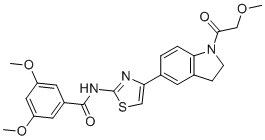
|
| DC65023 | ACE-083 Featured |
ACE083 is a Locally acting muscle-promoting agent
More description
|
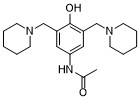
|
| DC74225 | YB-537 Featured |
YB-537 (YB537) is a potent, highly specific quinone reductase 2 (QR2) inhibitor with IC50 of 3 nM, shows no activity against QR1 (IC50>10 uM).
More description
|
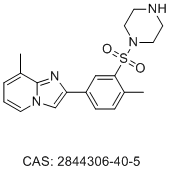
|
| DC10157 | PAβN dihydrochloride Featured |
PAβN dihydrochloride (MC-207110 dihydrochloride) is an efflux pump inhibitor.
More description
|

|
| DC60637 | BI-9508 Featured |
BI-9508 is a potent and selective, brain-penetrant GPR88 agonist with EC50 of 47 nM.
More description
|
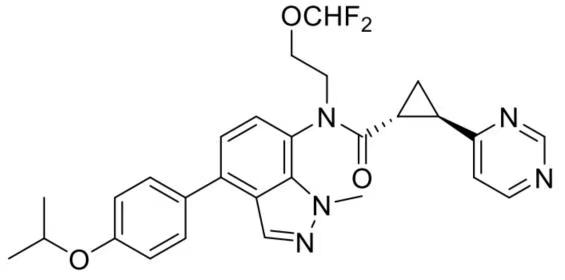
|
| DC73146 | MK-1468 Featured |
MK-1468 is a potent, selective, brain-penetrant LRRK2 inhibitor with IC50 of 0.4 nM (G2019S LRRK2), potently inhibits the phosphorylation of LRRK2 serine 935 (pSer935) in hPBMCs with IC50 of 2.8 nM.
More description
|

|
| DC66613 | BMS-986308 Featured |
BMS-986308 is a selective and orally active renal outer medullary potassium (ROMK) channel inhibitor. BMS-986308 is selective for ROMK over hERG. BMS-986308 can be used for heart failure research.
More description
|
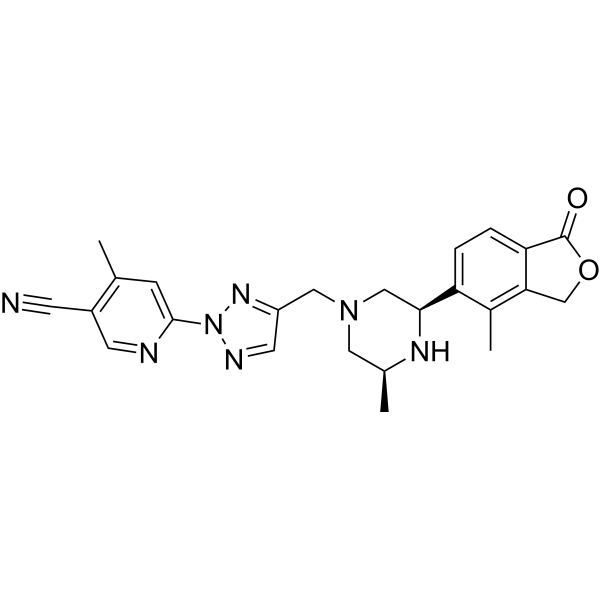
|
| DC74571 | VT107 Featured |
VT-107, as an analogous to VT104, is an orally active and potent pan-TEAD auto-palmitoylation inhibitor. VT-107 can be used for the research of cancer.
More description
|

|
| DC66602 | Gepotidacin mesylate Featured |
Gepotidacin, also known as GSK-2140944, is a potent Type II DNA topoisomerase inhibitor. Gepotidacin is a novel antibacterial drug candidate. Gepotidacin Demonstrates Absence of Fluoroquinolone-Like Arthropathy in Juvenile Rats. Gepotidacin is efficacious in a nonhuman primate model of pneumonic plague. When tested against Gram-negative (n = 333) and Gram-positive (n = 225) anaerobes by agar dilution, gepotidacin inhibited 90% of isolates at concentrations of 4 and 2 μg/mL, respectively.
More description
|
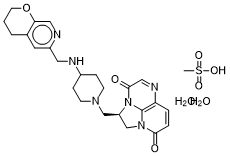
|
| DC66601 | Zoniporide Featured |
|
|
| DC74158 | S9-A13 Featured |
S9-A13 is a highly potent and specific inhibitor of SLC26A9, potently inhibits SLC26A9-mediated Cl−/I− and Cl−/SCN− exchange activities with IC50 of 90.9 and 171.5 nM, respectively.S9-A13 does not inhibit other members of the SLC26 family and has no effects on Cl− channels such as CFTR, TMEM16A, or VRAC.S9-A13 (0-1 uM ) inhibits SLC26A9 currents in a dose-dependent manner in HEK293 cells, but shows little effects on CFTR currents in HEK293 cells at the highest concentration (5 uM).S9-A13 has a minor effect on ion transport in human airway epithelial cells and mouse trachea, despite clear expression of SLC26A9 in the apical membrane of ciliated cells.
More description
|
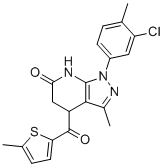
|
| DC44137 | 5-Propargylamino-ddUTP Featured |
5-Propargylamino-ddUTP, a nucleoside molecule that can be used to synthesis of cyanine dye-nucleotide conjugate which is used in nucleic acid labeling or sequence analysis.
More description
|

|
| DC66600 | BLU-222 Featured |
BLU-222 is an investigational, oral, potent, and selective CDK2 inhibitor. BLU-222 has shown robust anti-tumor activity in preclinical models of CCNE-aberrant ovarian, breast and gastric cancer.
More description
|

|
| DC66599 | β-D-Glucopyranosiduronic acid, tetradecyl Featured |
|
|
| DC66598 | Octadecyl β-D-glucopyranosiduronic acid Featured |
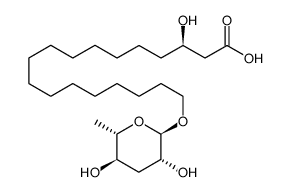
|
|
| DC66597 | 1-O-palmityl-D-glucuronic acid Featured |
|
|
| DC71559 | IZTZ-1 Featured |
IZTZ-1, an imidazole-benzothiazole conjugate, is a c-MYC G4 ligand. IZTZ-1 is able to downregulate the c-MYC expression by stabilizing c-MYC G4. IZTZ-1 induces cell cycle arrest, apoptosis, thereby inhibiting cell proliferation in B16 cells. IZTZ-1 shows antitumor activity, and can be used for melanoma research.
More description
|

|
| DC70730 | Ras binder 2C07 Featured |
Ras binder 2C07 is a switch-II binding ligand which binds Ras GDP and GTP states.
More description
|

|
| DC60622 | KM822 Featured |
KM822 is avselective, noncompetitive modulator of human dopamine transporter (DAT) with IC50 3.7 μM, which shows 30 and 50 folds higher than for human norepinephrine transporter (hNET) and human serotonin transporter (SERT), respectively.
More description
|
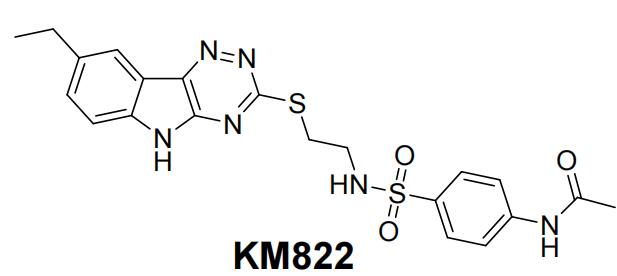
|
| DC20170 | Dapagliflozin propanediol monohydrate Featured |
Dapagliflozin propanediol belongs to the class of orally administered antidiabetic agents designated as sodiumglucose cotransporter 2 (SGLT2) inhibitors.
More description
|

|
| DC74438 | NRPa-308 Featured |
NRPa-308 is a neuropilin-1 (NRP-1) antagonist, inhibits the VEGF-A165/NRP-1 binding with IC50 of 42 uM, exerts in vitro anti-angiogenic activity.
More description
|

|
| DC40325 | ζ-Stat trisodium Featured |
ζ-Stat trisodium (NSC37044 trisodium) is a specific and atypical PKC-ζ inhibitor, with an IC50 of 5 μM. ζ-Stat trisodium can reduce melanoma cell lines proliferation and induce apoptosis, and has antitumor activity in vitro.
More description
|

|
| DC74161 | SAR439883 Featured |
SAR439883 (SAR 439883) is a novel potent, selective, orally active PKR inhibitor with IC50 of 0.68/0.69 uM against hPKR/mPKR, respectively.
More description
|
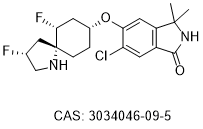
|
| DC22197 | PZ09(PKC-9) Featured |
PZ09 (PKC-zeta inhibitor 9, PKC-ζ inhibitor PZ9) is a potent, isoform selective PKC-zeta (PKC-ζ) inhibitor with IC50 of 5.18 nM, displays excellent selectivity (>200-fold) over other PKC isoforms with exception of PKC-i (10-fold). PZ09 also shows high selectivity for CDK-2 (>200-fold), as well as a broader range of other kinases (<50% inhibition at 10 uM). PZ09 is a small-molecule inhibitor, the first tool to successfully interrogate aPKC signaling in cells.
More description
|
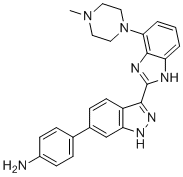
|
| DC8458 | Akt Inhibitor VIII Featured |
Akt Inhibitor VIII is a cell-permeable quinoxaline compound that has been shown to potently, selectively, allosterically, and reversibly inhibit Akt1, Akt2, and Akt3 activity (IC50 = 58 nM, 210 nM, and 2.12 μM; respectively).
More description
|

|
| DC66596 | Bartsiosid Featured |
Bartsioside is an anti-inflammatory agent which can be extracted from C. deserticola. Bartsioside exerts no significant cytotoxicity under 40 μM to BV-2 cells.
More description
|
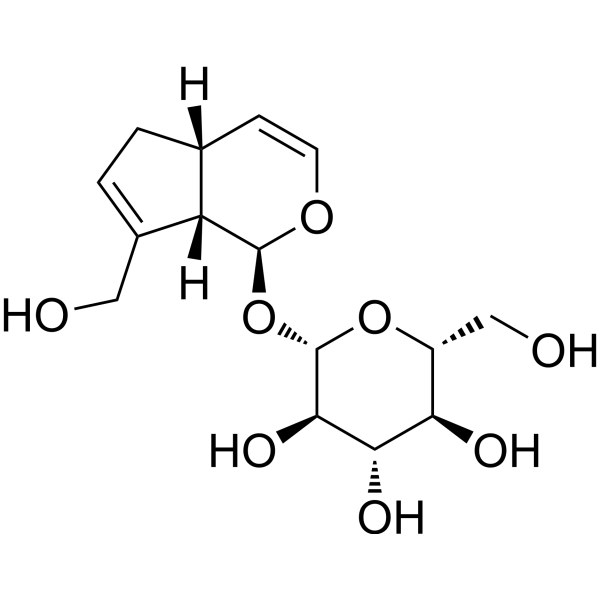
|
| DC66595 | (+)-UH 232 Featured |
(+)-UH 232 is a partially selective agonist of the D3 receptor with an intrinsic activity of 0.2-0.4. (+)-UH 232 antagonized quinpirole-induced mitogenesis with a Ki value of 9.4 nM.
More description
|
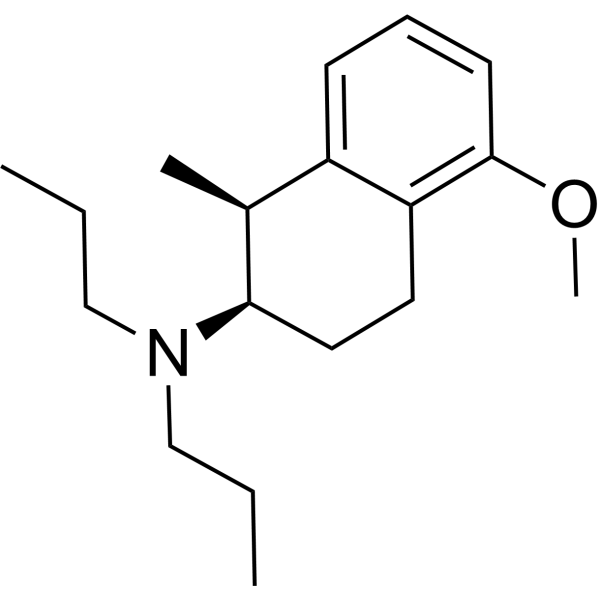
|
| DC66594 | AJ-76 Featured |
AJ-76 ((+)-AJ 76; (1S,2R)-AJ 76) is a dopamine autoreceptor antagonist. AJ-76 can increase the synthesis and turnover of dopamine in the rat brain, while having little effect on the synthesis and turnover of serotonin (5-HT) and norepinephrine. AJ-76 can also antagonize the sedative effects of low-dose apomorphine and has a weak antagonistic effect on postsynaptic dopamine receptor.
More description
|
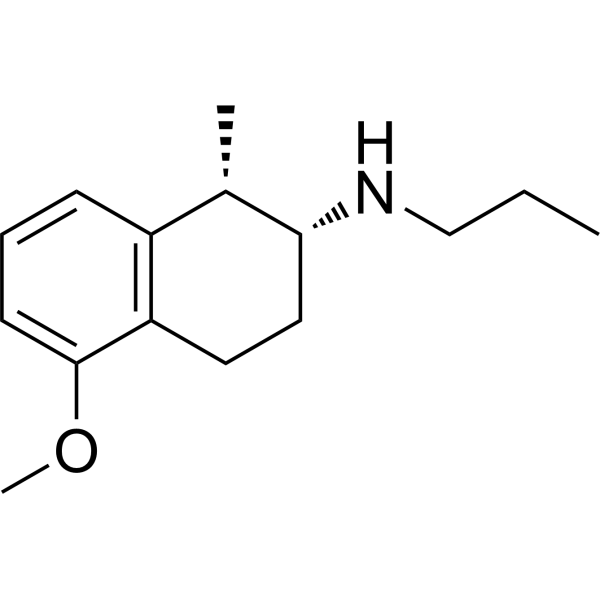
|
| DC66593 | HP-NH2 Featured |

|
|
| DC66592 | GW274150 dihydrochloride Featured |
GW274150 (dihydrochloride) is a potent, selective, orally active and NADPH-dependent inhibitor of human inducible nitric oxide synthase (iNOS) (IC50=2.19 μM; Kd=40 nM) and rat iNOS (ED50=1.15 μM). GW274150 (dihydrochloride) displays less potency for both humans or rats endothelial NOS (eNOS) and neuronal NOS (nNOS). GW274150 (dihydrochloride) exerts a protective role in an acute model of lung injury inflammation.
More description
|
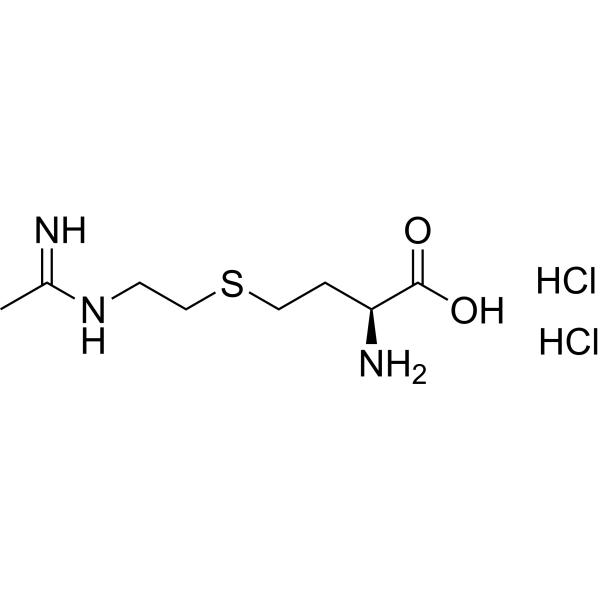
|